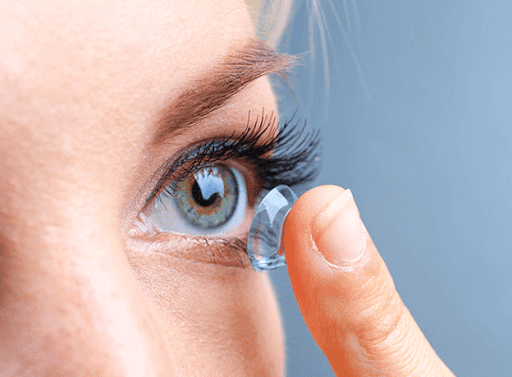Signs that Tell it is Time to Replace Your Contact Lenses:
 There’s a proper hygiene regime that needs to be followed when it comes to contact lenses. Taking care of contact lenses can be challenging for the first-timers as well as the veterans of contact. Contact Lenses have expiry dates that you strictly have to follow or it can cause irritation, itchiness, hypoxia, or any serious infection. In a study conducted by the Centre for Contact Lens Research, about 40 percent of the lens wearers do not replace their contacts beyond the replacement schedule. Also, it is reported that some of the people don’t even know that the contact lenses expire in a short period. The study tells that, in some cases, the eye doctors give out false information about the expiration dates of prescribed contact lenses.
There’s a proper hygiene regime that needs to be followed when it comes to contact lenses. Taking care of contact lenses can be challenging for the first-timers as well as the veterans of contact. Contact Lenses have expiry dates that you strictly have to follow or it can cause irritation, itchiness, hypoxia, or any serious infection. In a study conducted by the Centre for Contact Lens Research, about 40 percent of the lens wearers do not replace their contacts beyond the replacement schedule. Also, it is reported that some of the people don’t even know that the contact lenses expire in a short period. The study tells that, in some cases, the eye doctors give out false information about the expiration dates of prescribed contact lenses.
If you are a contact lens wearer, you should be extra careful about your lenses and their expiration dates. If you use the contact lenses longer than they are designed to last, protein and other things start to deposit on the material of the lenses which reduces their breathability. As a result of which, your eyes are at the risk of getting infected or other eye complications like dry eyes and corneal ulcers. Here are some signs that you should not ignore and rush to your eye practitioner as soon as possible.
Cloudy/Blurry Lenses:
Lenses should provide a crisp vision. If the lenses do not feel as clear as they were when you first bought them, there’s a strong chance that they have been infected by bacteria. To test them if they have bacteria on them, dip them in the contact lens solution and wear them again. If they stay blurry like they were previously then it’s time to throw the pair away
Permanent Bends or Dents on the Contact Lenses:
You should check your contact lenses as soon as you buy them or get your eye doctor to examine them thoroughly for any damage. Any kind of damage in the shape of a dent or bend is a portal for the bacteria and other impurities to pass-through them. It only makes it worse instead of protecting your eyes.
Discomfort and Irritation:
Irritation, itchiness, redness, or any other kind of discomfort is a red flag. If you are feeling something unusual with the lenses, it means there is something wrong with them and you should take them off immediately and run to your doctor. Dirt or dust of the contact lenses is normal and it can be easily removed by saline solution, so never forget to rinse with the solution before wearing them. Also, check your contact lenses for scratches as they can damage your eyes. If you see any scratch on it then it’s time to say goodbye to them.
No protection from UVs:
Ultraviolet rays from the sun can damage your eyes cause eye conditions like corneal diseases, macular degeneration, and cataracts. Older technology of contact lenses did not have UV protection. Those kinds of lenses did not allow oxygen to pass through them either. If you have had one of those pairs then it might be a good idea to switch to the newer technologies of contact lenses. The latest lenses’ materials have been modified and designed in such a way that protect your eyes from UVs and allow oxygen to pass through them.
Reaching Expiration Date of lenses:
 Nowadays, contact lenses are available with different prescription expiry dates; there are daily, weekly, biweekly and monthly lenses. The daily lenses should be disposed of after wearing them for a single day. The biweekly lenses need to be thrown away after a fortnight. And, the monthly lenses should be replaced after a month. You should consult your eye specialist before getting contact lenses for yourself to find the right type of contact lenses for you.
Nowadays, contact lenses are available with different prescription expiry dates; there are daily, weekly, biweekly and monthly lenses. The daily lenses should be disposed of after wearing them for a single day. The biweekly lenses need to be thrown away after a fortnight. And, the monthly lenses should be replaced after a month. You should consult your eye specialist before getting contact lenses for yourself to find the right type of contact lenses for you.
One of the greatest misconceptions about the expiry dates of contact lenses is that they are to get consumers to purchase more. In fact, replacing lenses when their expiry date has arrived is a matter of health and hygiene. Rinsing the lenses in the saline solution does clean them but it does not work that way in the long-run.
Overuse of contact lenses can cause small pores in the lens material to be blocked by bacteria, protein, and bacteria which hinders the passage of oxygen to your cornea while wearing them.
If you can relate to one or more signs stated above, then it’s time for you to change your contact lenses right away. You should strictly follow all the instructions that your eye doctor has told you and never ignore any kind of unusual feeling. Also, you should keep your pair of lenses in optimum condition while you are still using them before their expiration date.


